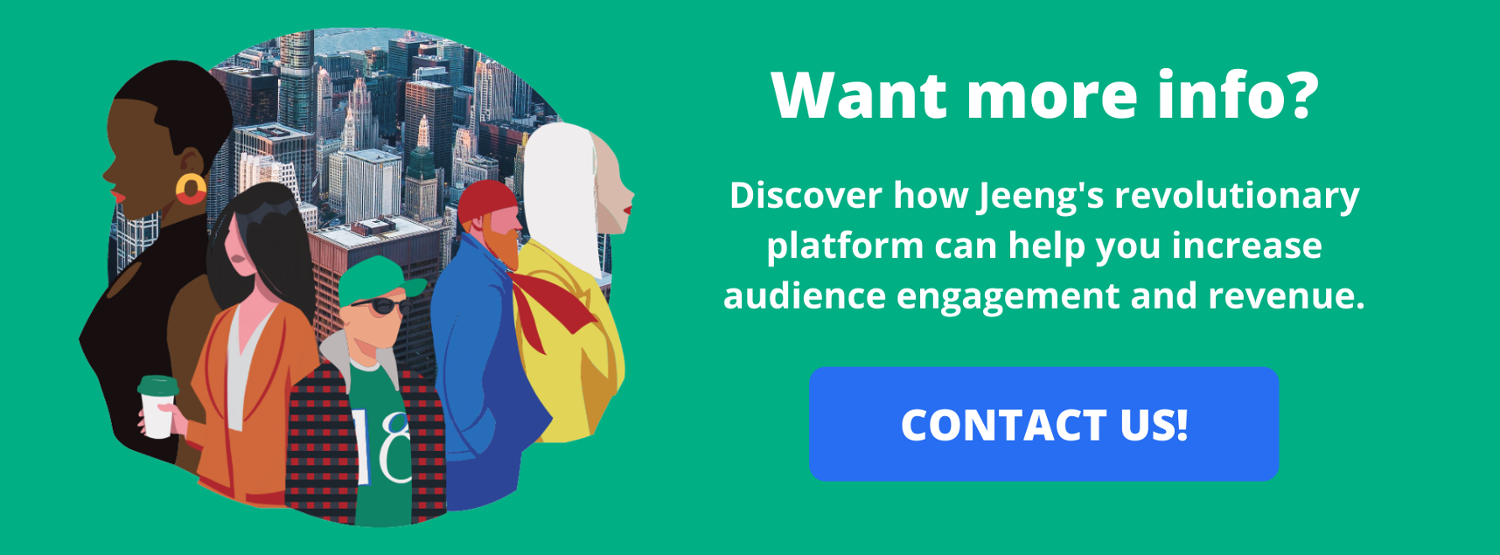It’s easy to see how personalization benefits publishers and advertisers. By providing personalized experiences across channels, businesses can better increase customer engagement and revenue.
As McKinsey & Company reported, fast-growing companies drive 40% more of their revenue from personalization than their slower-growing competitors

Still, even with all this talk about end goals and profits, there’s an important part of the equation we can’t afford to skip over: the customer.
At its core, personalized marketing has to be about building better customer experiences. It’s not just a means to an end KPI. Rather, it’s a company-wide commitment to meeting and exceeding customer expectations with personalized content at every touchpoint.
Especially now that we’ve reached a new tentpole in the history of email marketing, personalized marketing strategies are more important than ever.

According to Jeeng’s 2022 Digital Publishing Survey Report, content consumption is increasing across channels — including publisher newsletters and websites. And 35% of U.S. audiences report paying for a subscription, up from 20% last year.

How can publishers continue to win and retain these content-hungry audiences? With personalized marketing campaigns, especially on high-engagement platforms like email.
To help, we’ll dive into the biggest benefits of personalization for your most valuable assets — your subscribers — and how you can deliver personalized experiences that drive results.
What is personalized marketing?
Personalized marketing is the process of creating and distributing content that’s tailored to the interests, needs, and behaviors of a certain audience.
Publishers, for example, might personalize content for subscribers according to their:
- Demographics. Ex: age, gender, location, employment, income, device
- Behaviors. Ex: purchasing online, downloading assets, filling out sign-up forms
- Contexts. Ex: website articles about politics, email newsletters about sports
Along with creating relevant content, personalized marketing also involves reaching target audiences at the right time on the right channels where they’re already active.
A fashion publisher, for example, might deliver product roundups to mobile users over the weekend when they’re likely to be online shopping. Or a news publisher might reach desktop users with browser push notifications in the morning when they’re starting their work day.
With personalized digital marketing efforts, publishers have a near-endless amount of ways to engage customers and nurture relationships throughout the marketing funnel.
Why are personalized marketing campaigns important?
Before we get into why personalized campaigns are advantageous for consumers, let’s take a quick look at how personalized marketing strategies benefit the publishers who build them.
According to our recent survey, 98% of U.S. adults check their email at least once per day — up from 90% last year — and 77% do so several times per day — up from 67% last year. Publishers can reach this growing audience and stand out among the noise by investing in personalized email marketing.
In fact, over half of U.S. adults want email newsletters from publishers to be personalized to their interests — a jump from 42% last year. And half want website content from publishers to be personalized to their interests — an increase from 44% last year.
Evidently, publishers can’t afford not to use email and website personalization strategies. Their audiences are clearly eager for customized experiences across platforms.

What are the benefits of personalization for subscribers?
Now, let’s unpack the benefits of personalization for your audience. By using the right customer data and marketing channels, publishers can effectively:
Improve customer satisfaction
Personalization helps publishers provide more value to their subscribers, which can increase customer retention and satisfaction. As we found, almost 60% of consumers would subscribe to emails with personalized content, and nearly half would pay for a subscription to a digital publication or email in exchange for personalization. And this is especially true among millennials.

Over 75% of respondents also said they’d like to receive real-time, breaking news updates from publishers. This means that publishers have a major opportunity to find the right times to reach their readers and grab their attention with personalized marketing strategies.
Build trusting relationships
Personalized marketing can yield stronger, more trusting customer relationships, which can eventually lead to retention and brand loyalty. Cultivating this trust is particularly important now that consumers are wary of data privacy issues and misinformation — especially across social media platforms.
In fact, among those who get their news from Facebook, only 1 in 5 say it’s very trustworthy and 40% say it’s not trustworthy at all. Meanwhile only 24% of these respondents say Twitter is trustworthy and nearly 55% are skeptical.

So, by personalizing website and email campaigns, publishers can offer consumers the trust they’re missing on other channels.
Deliver more relevant ad experiences
Beyond just personalizing organic messaging, publishers can also use personalization strategies to deliver more effective and targeted ads. This way, publishers can make their ad partners happy and drive revenue, and subscribers can enjoy relevant product and content recommendations that match their interests.
As Jeeng found, 43% of U.S. adults say ads in emails don’t bother them and 69% say they will click on an ad in an email newsletter if it is interesting or relevant.
How can you launch personalized marketing campaigns?
The future of personalization is now. And publishers that don’t start launching customized campaigns for their audiences risk getting left behind.
That’s where Jeeng can help.
Our marketing personalization platform uses powerful AI to collect data from your audience, build targeted audience segments, deliver customized campaigns across platforms like email, websites, push notifications, and newsreaders.
Our monetization tools can also help you generate ad revenue and engage subscribers with paid placements — reaching them where they’re already active.
Ready to see the benefits of personalization for your business? Contact us to learn more.


